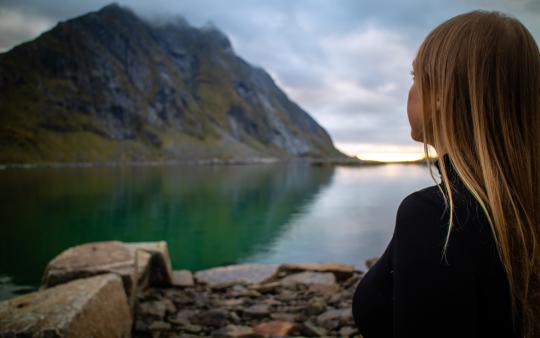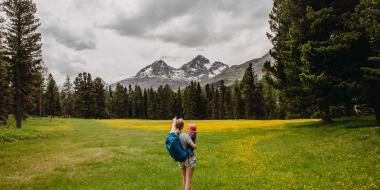“We’re not making any pollution!" my older son exclaimed, as we were waiting on our bicycles at a traffic light. Despite my initial surprise - the comment came out of nowhere - I responded, “You’re right! Because we’re bicycling.”
I thought, he has been listening to me!
As parents, we can talk all we want about environmental sustainability, but unless our kids see us living out our values, our words will fall flat. Kids are excellent at seeing right through our talk, so we need to both speak and act in ways that are good for the Earth and all of the people on it. Fortunately, from sustainable food to activism, making environmentally-conscious choices can teach our kids a variety of important values and skills.
Teaching compassion and interconnectedness
One of the most important values sustainability teaches is interdependence. Even the earliest childhood education classes in ecology teach that all plants and animals are connected - as are people! In the era of COVID-19, the impacts of our own actions on others and the deeply interconnected nature of life was never more stark.
But there are positive ways to illustrate the principle of interdependence. Green living provides many opportunities to talk about the ripple effect of our actions. For example, gardening and buying from local farmers can spark conversations about how people grow food and who those people are. Borrowing books from the library, or buying second-hand, can lead to discussions about how little people are paid to make new clothes or how plastic toys lead to pollution. Showing children the utility bill that describes the wind power you purchase can spark insight into where energy comes from. Thinking about how even the smallest actions affect others can build a sense of compassion and empathy in our children for those in our communities and beyond.
Building essential skills through environmental activism
To act on that compassion, children need to develop both responsibility and competence. One activity that helps foster both of these is gardening. A study in Texas has shown that students who participated in a school gardening program had a significant improvement in life skills after completing the program.
Ecological practices can contribute to a deeper awareness of the interconnected nature of life in a number of ways. In addition to understanding the consequences of not taking care of plants (and acquiring the personal resilience of dealing with failure along the way!), growing your own food or maintaining a garden can result in personal growth and responsibility-taking for children. Similarly, learning to compost or helping with the extra dishes (instead of using disposables) can teach children how to pitch in. Completing chores together has helped my children see that they also have a role to play in keeping our household running. On a larger scale, environmental activism builds essential skills that kids will use in their adult lives, such as public speaking, networking, and community organizing.
Nurturing community and connection
Environmentally-friendly activities also provide ways to build connections with others around us, even under social-distancing conditions. Walking, biking, and taking public transportation creates spontaneous opportunities to introduce ourselves and build relationships with neighbors. My older son’s insistence on taking daily evening walks has led to relationships with our neighbors that would have never developed otherwise.
A study in Sweden has shown that people commuting by car were less likely to say they trusted people in general than those who used other modes of transit. Whether it's cleaning up a local stream or planting trees, volunteering outdoors brings family members together and reminds us of the others in our communities who share these common spaces.
According to the Children and Nature Network, the outdoors is a perfect space for families to spend time focusing on each other and sharing emotional experiences. Coming together to sign a petition or march in a climate protest (when it’s possible to meet up again!) builds relationships between people of different backgrounds, ages, and experiences. My activist work as a high schooler, college student, and adult introduced me to more diverse groups of people than any other activity I’ve done.
Developing responsible and critical thinkers
These connections can and should inspire discussions about the systems that underpin our behavior, whether they support or discourage it. Researchers have identified critical hopefulness as an important attitude underlying civic action — a combination of understanding power structures while still believing that they are capable of being changed.
Making consciously "green" choices, and thinking through the underlying societal issues, can help develop critical hopefulness. For example, walking through a neighborhood with sidewalks in need of repair perfectly illustrates how often society values driving over walking. Similarly, noticing how difficult it is to purchase goods that aren’t packaged in plastic demonstrates how much corporate decisions affect our behavior. Looking at who and what in society holds power helps children become aware of the ways in which they can influence their world in a positive way.
Taking action for a better future
Understanding the interconnected nature of society and developing a sense of personal responsibility can help children learn to take action about causes that are important to them. A study at Brown University has shown that students involved in youth organizing were more likely to be involved in other civic activities, including contacting their representatives and solving problems in their communities. Teenage and pre-teen activists I have interviewed responded that they have found pushing for change to be incredibly empowering. Levi Draheim, the youngest person on the Juliana V. United States lawsuit against the federal government on climate change, said that being involved helped him feel like he had the ability to influence his own future.
We all want our kids to grow up to be kind, responsible and connected adults. Often, society frames environmental sustainability as something we choose individually and have separate from the rest of our lives. But in fact, it can be integrated into everything. The more ways we find to live sustainably, from individuals and families to our communities and beyond, the more we can raise children who will build a better future for everyone.
You may also enjoy: How to Teach Children to Care About the Environment, Why Children Need Nature for Future Well-Being and Bringing Nature into the Classroom (or the Classroom into Nature)









